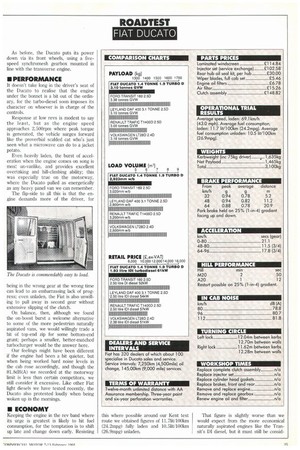ROADTEST
Page 33

If you've noticed an error in this article please click here to report it so we can fix it.
FIAT DUCATO
As before, the Ducat() puts its power down via its front wheels, using a fivespeed synchromesh gearbox mounted in line with the transverse engine.
• PERFORMANCE
It doesn't take long in the driver's seat of the Ducat° to realise that the engine under the bonnet is a bit out of the ordinary, for the turbo-diesel soon imposes its character on whoever is in charge of the controls.
Response at low revs is modest to say the least, but as the engine speed approaches 2,500rpm where peak torque is generated, the vehicle surges forward like the proverbial scalded cat who's just seen what a microwave can do to a jacket potato.
Even heavily laden, the burst of acceleration when the engine comes on song is most un-vanlike, and provides excellent overtaking and hill-climbing ability; this was especially true on the motorway, where the Ducat° pulled as energetically as any heavy panel van we can remember.
The flip-side to all this is that the engine demands more of the driver, for being in the wrong gear at the wrong time can lead to an embarrassing lack of progress; even unladen, the Fiat is also unwilling to pull away in second gear without extensive slipping of the clutch.
On balance, then, although we found the on-boost burst a welcome alternative to some of the more pedestrian naturally aspirated vans, we would willingly trade a bit of top-end zip for some bottom-end grunt; perhaps a smaller, better-matched turbocharger would be the answer here.
Our feelings might have been different if the engine had been a bit quieter, but when being worked hard noise levels in the cab rose accordingly, and though the 81.8dB(A) we recorded at the motorway limit is less than certain competitors, we still consider it excessive. Like other Fiat light diesels we have tested recently, the Ducat° also protested loudly when being woken up in the mornings.
• ECONOMY
Keeping the engine in the rev band where its urge is greatest is likely to hit fuel consumption, for the temptation is to shift up late and change down early. Resisting • this where possible around our Kent test route we obtained figures of 11.7lit/100km (24.2mpg) fully laden and 10.5lit/100km (26.9mpg) unladen.
That figure is slightly. worse than we would expect from the more economical naturally aspirated engines like the Transit's DI diesel, but it must still be consid




















































































































